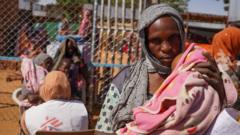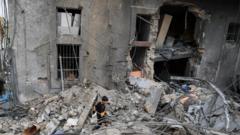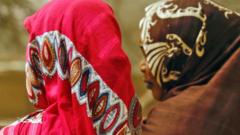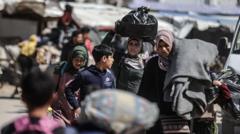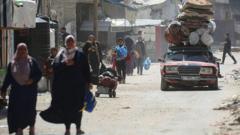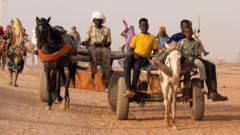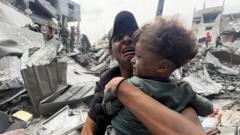Caught in the crossfire of Sudan’s relentless civil war, the citizens of el-Fasher are grappling with unimaginable loss and fear. As a city besieged by the Rapid Support Forces (RSF) for over a year, the struggle for survival has reshaped lives forever. Hearts have been shattered, yet stories of courage and resilience emerge from the darkness as families fight for their futures amidst unyielding violence.
**Despair and Resilience: Life Under Siege in El-Fasher Amid Sudan's Civil War**

**Despair and Resilience: Life Under Siege in El-Fasher Amid Sudan's Civil War**
An inside look at the harrowing experiences of civilians trapped in el-Fasher, Sudan, as humanitarian crises deepen amidst ongoing conflict.
In August 2024, Hafiza quietly remembers her mother, who tragically died in a shell attack on the marketplace in el-Fasher. The catastrophic repercussions of the ongoing conflict have left Hafiza, just 21, to care for her young siblings. The family’s loss is all too common in a city that has suffered immense devastation since the civil war erupted two years prior, igniting a humanitarian crisis of staggering proportion.
El-Fasher has been effectively cut off from the outside world for the last year, complicating any efforts by journalists to report on the plight of its residents. Yet, the BBC has managed to slip phones into the hands of a few survivors, allowing them to capture and share their stories through recorded videos. Among them, Mostafa, a 32-year-old volunteer, details the daily bombardments he endures while trying to support thousands of displaced people living in shelters amid extreme shortages of food and clean water. His video messages echo the desperation, with artillery fire constantly illuminating the bath of survival in which he and others dwell.
Manahel, another resident, shares a bittersweet perspective, having transitioned from a recent university graduate to a lifeline for those in need. She prepared meals for displaced families, many of whom are struggling to find even a single square meal per day. The impact of spiraling prices and scarcity plunges entire families into the depths of suffering, with everyone now facing the same grim reality of hunger and instability regardless of their prior economic status.
Amid this chaos, the RSF has maintained tight control over the city and its resources, often choosing who gets in and out as they continue to battle for supremacy against the Sudanese military forces. The RSF’s conduct towards opposition and ethnic minorities has drawn global condemnation and accusations of ethnic cleansing, further complicating the plight of non-Arab communities in Darfur, including those in el-Fasher.
With the pervasive atmosphere of dread, particularly for women, who fear assault if the RSF gains complete control, many families feel they have no choice but to flee. Despite grave threats and uncertainty, Hafiza, Mostafa, and Manahel decided to leave el-Fasher behind in November 2024, seeking refuge in nearby towns as hope for peace dwindles.
As the conflict drags on, el-Fasher remains a focal point in Sudan's fractured landscape, where battles are fought not only with weapons but with the will to survive. The resilience shown by these civilians symbolizes a collective plea for an end to suffering and the hope that one day they might find solace and stability once again.
El-Fasher has been effectively cut off from the outside world for the last year, complicating any efforts by journalists to report on the plight of its residents. Yet, the BBC has managed to slip phones into the hands of a few survivors, allowing them to capture and share their stories through recorded videos. Among them, Mostafa, a 32-year-old volunteer, details the daily bombardments he endures while trying to support thousands of displaced people living in shelters amid extreme shortages of food and clean water. His video messages echo the desperation, with artillery fire constantly illuminating the bath of survival in which he and others dwell.
Manahel, another resident, shares a bittersweet perspective, having transitioned from a recent university graduate to a lifeline for those in need. She prepared meals for displaced families, many of whom are struggling to find even a single square meal per day. The impact of spiraling prices and scarcity plunges entire families into the depths of suffering, with everyone now facing the same grim reality of hunger and instability regardless of their prior economic status.
Amid this chaos, the RSF has maintained tight control over the city and its resources, often choosing who gets in and out as they continue to battle for supremacy against the Sudanese military forces. The RSF’s conduct towards opposition and ethnic minorities has drawn global condemnation and accusations of ethnic cleansing, further complicating the plight of non-Arab communities in Darfur, including those in el-Fasher.
With the pervasive atmosphere of dread, particularly for women, who fear assault if the RSF gains complete control, many families feel they have no choice but to flee. Despite grave threats and uncertainty, Hafiza, Mostafa, and Manahel decided to leave el-Fasher behind in November 2024, seeking refuge in nearby towns as hope for peace dwindles.
As the conflict drags on, el-Fasher remains a focal point in Sudan's fractured landscape, where battles are fought not only with weapons but with the will to survive. The resilience shown by these civilians symbolizes a collective plea for an end to suffering and the hope that one day they might find solace and stability once again.




